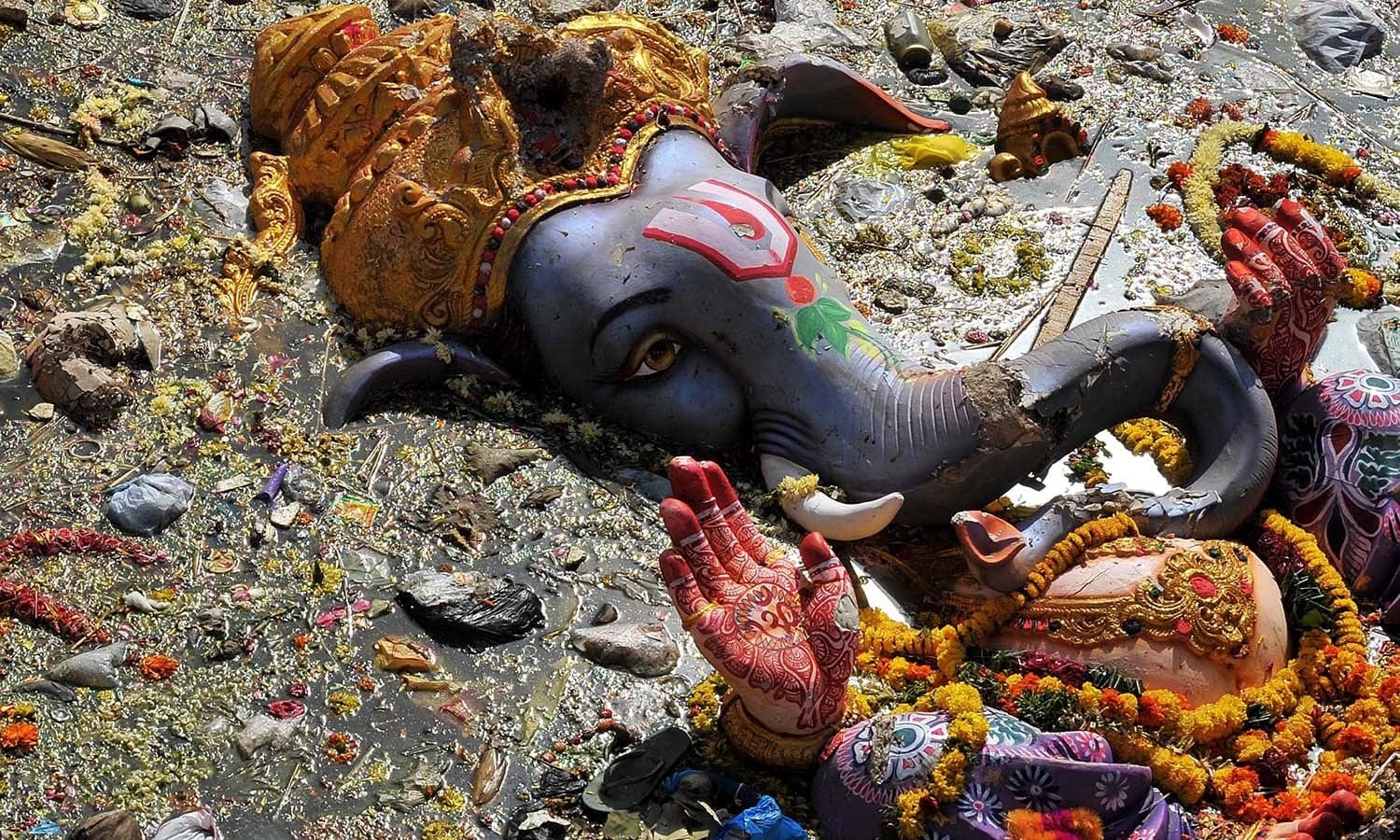–An Article by Poojan Patel
Ganesh Chaturthi, a cherished festival in Hindu culture, has undergone a transformation over the years. What was once a deeply religious and community-oriented celebration has now found itself in the midst of commercialization, raising ethical and moral dilemmas that beg for thoughtful consideration. Let us explore the evolving landscape of Ganesh Chaturthi, from its traditional roots to the modern commercial spectacle, and reflect on the ethical dimensions of this transformation. While the festival was once a simple, community-centric celebration, it has now evolved into a grandiose affair with commercial overtones. This transformation raises ethical and moral dilemmas surrounding the capitalization of a beloved deity.
Traditional Celebrations vs. Modern Extravaganza
 Traditionally, Ganesh Chaturthi was marked by modest clay idols lovingly crafted by local artisans. Communities came together to install these idols in their neighborhoods, offering prayers and seeking blessings. The immersion of the idols in local water bodies symbolized the cyclical nature of life.
Traditionally, Ganesh Chaturthi was marked by modest clay idols lovingly crafted by local artisans. Communities came together to install these idols in their neighborhoods, offering prayers and seeking blessings. The immersion of the idols in local water bodies symbolized the cyclical nature of life.
In contrast, modern celebrations have become grand spectacles. Elaborate processions, towering idols, and ostentatious decorations have become the norm. The festival now attracts sponsorships from corporations and politicians, resulting in a commercialized extravaganza.
Ethical and Moral Dilemmas
 The commercialization of Ganesh Chaturthi raises several ethical and moral dilemmas. The shift from eco-friendly clay idols to PoP idols has adverse environmental consequences, as PoP takes centuries to disintegrate and harms aquatic ecosystems. The mass production of idols in sweatshops under poor labor conditions also warrants ethical concerns.
The commercialization of Ganesh Chaturthi raises several ethical and moral dilemmas. The shift from eco-friendly clay idols to PoP idols has adverse environmental consequences, as PoP takes centuries to disintegrate and harms aquatic ecosystems. The mass production of idols in sweatshops under poor labor conditions also warrants ethical concerns.
Moreover, the pressure to outdo previous celebrations often leads to extravagant displays that are far removed from the festival’s humble origins. This excessive expenditure raises questions about priorities and the values associated with the festival.
- Environmental Impact: The use of non-biodegradable materials for idol production, such as plaster of Paris and chemical-based paints, poses a grave threat to the environment. These pollutants harm aquatic ecosystems when idols are immersed in water bodies, contradicting the festival’s original reverence for nature.
- Commercial Exploitation: The commodification of Ganesh Chaturthi has raised concerns about commercial exploitation. Corporate sponsorships and advertising have infiltrated the festival, shifting its focus from spirituality to profit. The sale of mass-produced idols diminishes the livelihoods of traditional artisans.
- Religious Sensibilities: Many question the ethics of monetizing a religious festival. Critics argue that the excessive commercialization dilutes the sacredness of Ganesh Chaturthi, reducing it to a mere spectacle for profit.
- Community Bonds: Modern celebrations often involve private ceremonies, restricting community involvement. This shift from a collective celebration to private, opulent displays can erode the sense of unity and togetherness that defined the festival in the past.
Conclusion: A Delicate Balance
 The transformation of Ganesh Chaturthi into a commercialized extravaganza is a double-edged sword. On one hand, it introduces new elements, attracts tourists, and injects capital into local economies. On the other hand, it risks diluting the festival’s spiritual essence, harming the environment, and undermining community bonds.
The transformation of Ganesh Chaturthi into a commercialized extravaganza is a double-edged sword. On one hand, it introduces new elements, attracts tourists, and injects capital into local economies. On the other hand, it risks diluting the festival’s spiritual essence, harming the environment, and undermining community bonds.
 The key lies in striking a balance. It is possible to maintain the grandeur of modern celebrations while respecting tradition and values. Efforts to promote eco-friendly idols, community engagement, and responsible sponsorship can help mitigate the ethical and moral dilemmas associated with the commercialization of Ganesh Chaturthi. In doing so, we can preserve the festival’s core values of devotion, unity, and reverence for nature while embracing the opportunities of the modern world. Ultimately, it’s crucial to approach the festival with reverence and mindfulness, remembering that Lord Ganesha’s blessings are not measured in extravagance but in the sincerity of our devotion.
The key lies in striking a balance. It is possible to maintain the grandeur of modern celebrations while respecting tradition and values. Efforts to promote eco-friendly idols, community engagement, and responsible sponsorship can help mitigate the ethical and moral dilemmas associated with the commercialization of Ganesh Chaturthi. In doing so, we can preserve the festival’s core values of devotion, unity, and reverence for nature while embracing the opportunities of the modern world. Ultimately, it’s crucial to approach the festival with reverence and mindfulness, remembering that Lord Ganesha’s blessings are not measured in extravagance but in the sincerity of our devotion.





